Coaching, Mentoring, and Learning Interventions in Organisations
VerifiedAdded on 2023/06/16
|10
|3587
|107
Report
AI Summary
This report explores the significance of coaching and mentoring within organisations, highlighting their similarities and differences, and comparing them with other learning interventions like team development and training programs. It assesses the essential skills and behaviours required for effective coaching and mentoring, such as active listening, building trust, and providing corrective feedback. Furthermore, the report examines the role of coaching and mentoring in building resilience and managing change, emphasizing strategies for fostering a positive attitude and strong relationships. The report concludes with a reflection on personal performance in a peer coaching exercise, utilizing Gibbs' reflective cycle to analyze the experience.
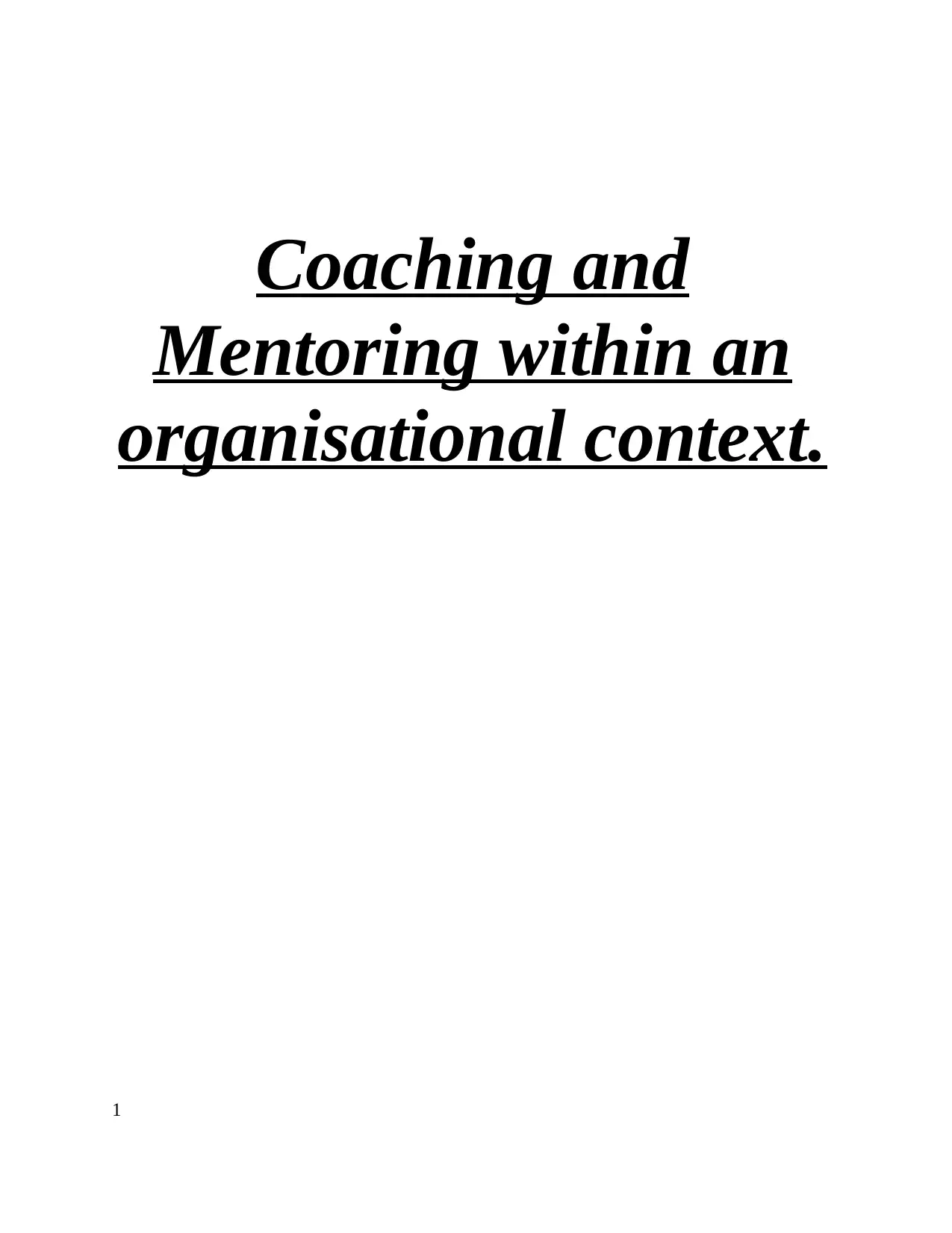
Coaching and
Mentoring within an
organisational context.
1
Mentoring within an
organisational context.
1
Paraphrase This Document
Need a fresh take? Get an instant paraphrase of this document with our AI Paraphraser
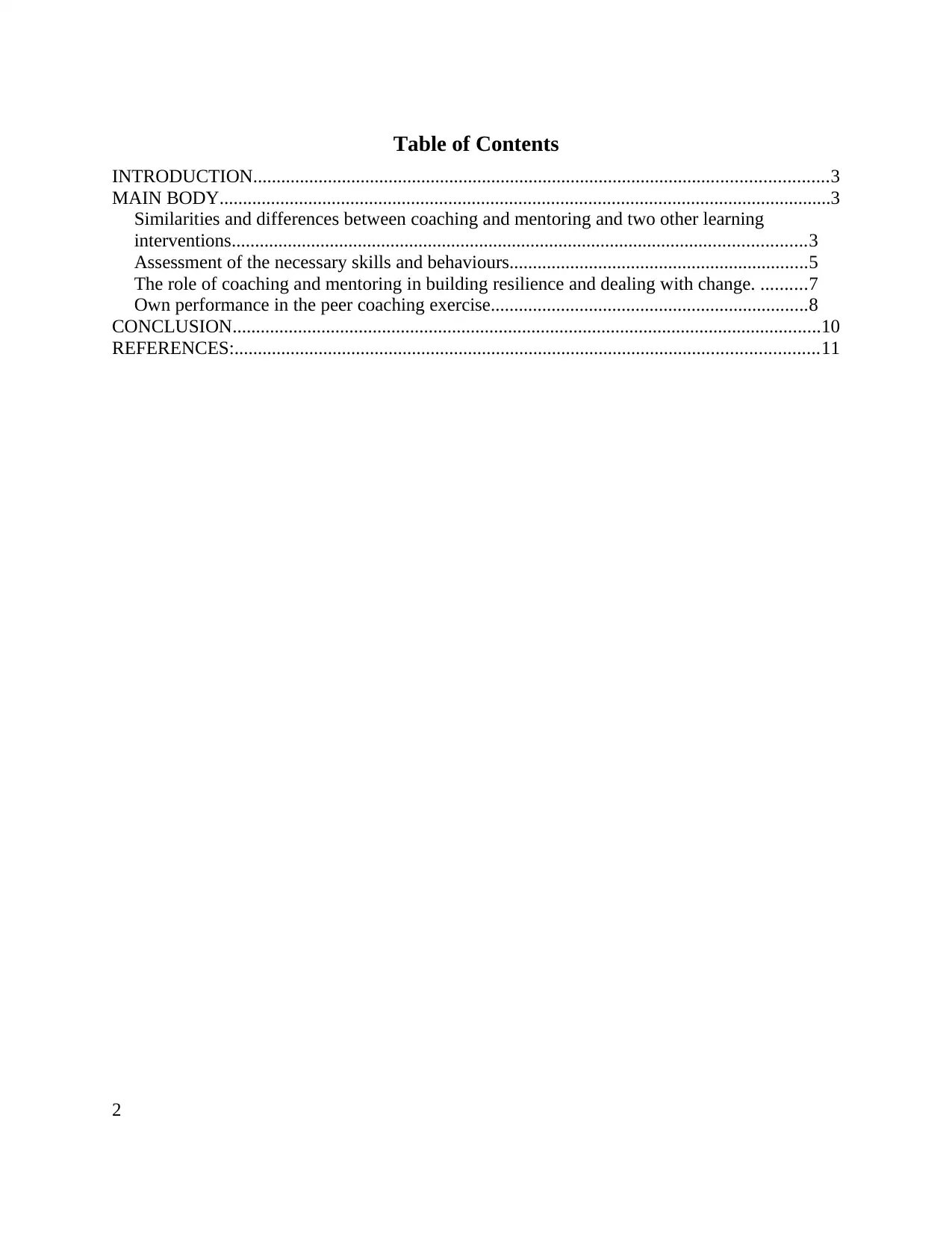
Table of Contents
INTRODUCTION...........................................................................................................................3
MAIN BODY...................................................................................................................................3
Similarities and differences between coaching and mentoring and two other learning
interventions...........................................................................................................................3
Assessment of the necessary skills and behaviours................................................................5
The role of coaching and mentoring in building resilience and dealing with change. ..........7
Own performance in the peer coaching exercise....................................................................8
CONCLUSION..............................................................................................................................10
REFERENCES:.............................................................................................................................11
2
INTRODUCTION...........................................................................................................................3
MAIN BODY...................................................................................................................................3
Similarities and differences between coaching and mentoring and two other learning
interventions...........................................................................................................................3
Assessment of the necessary skills and behaviours................................................................5
The role of coaching and mentoring in building resilience and dealing with change. ..........7
Own performance in the peer coaching exercise....................................................................8
CONCLUSION..............................................................................................................................10
REFERENCES:.............................................................................................................................11
2
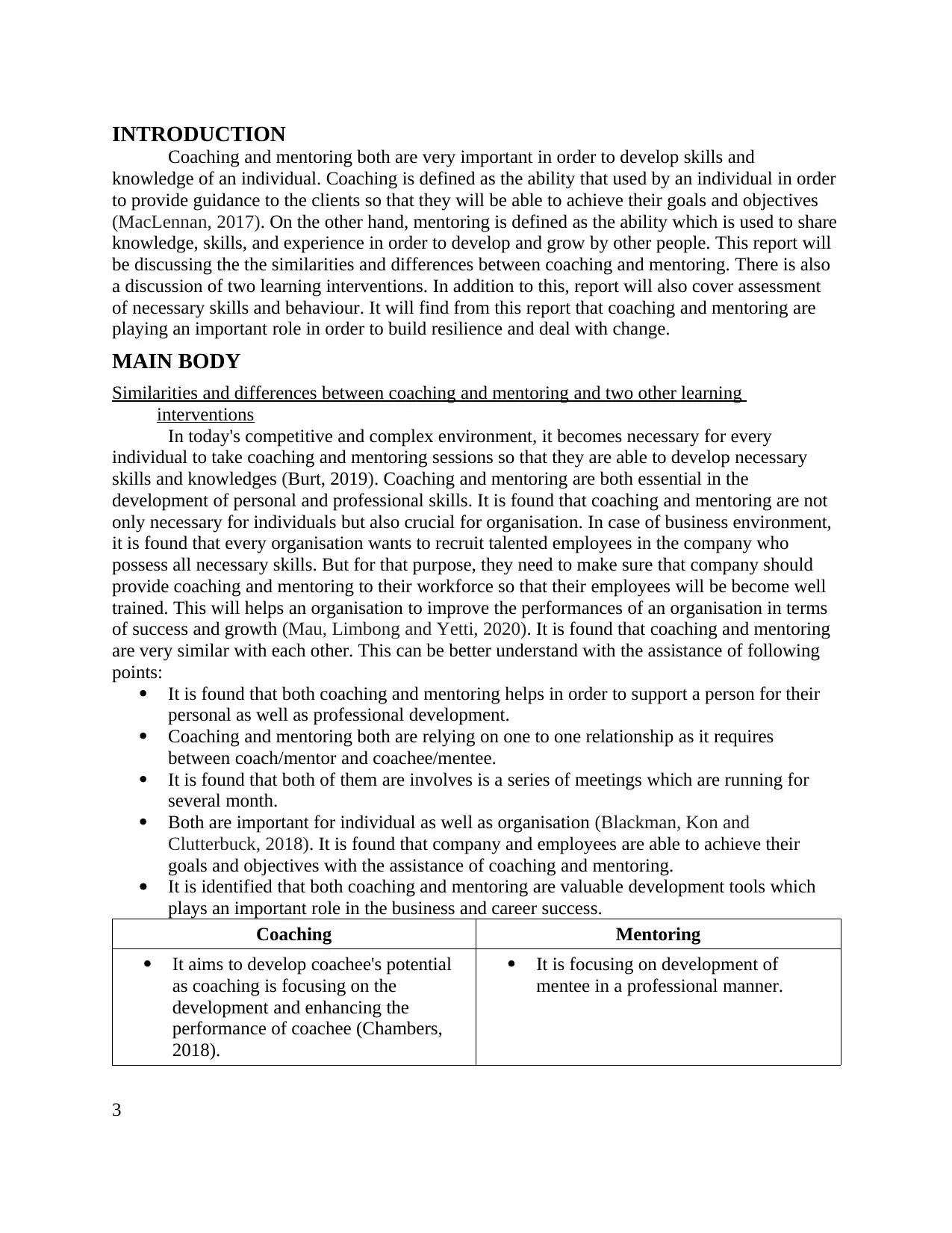
INTRODUCTION
Coaching and mentoring both are very important in order to develop skills and
knowledge of an individual. Coaching is defined as the ability that used by an individual in order
to provide guidance to the clients so that they will be able to achieve their goals and objectives
(MacLennan, 2017). On the other hand, mentoring is defined as the ability which is used to share
knowledge, skills, and experience in order to develop and grow by other people. This report will
be discussing the the similarities and differences between coaching and mentoring. There is also
a discussion of two learning interventions. In addition to this, report will also cover assessment
of necessary skills and behaviour. It will find from this report that coaching and mentoring are
playing an important role in order to build resilience and deal with change.
MAIN BODY
Similarities and differences between coaching and mentoring and two other learning
interventions
In today's competitive and complex environment, it becomes necessary for every
individual to take coaching and mentoring sessions so that they are able to develop necessary
skills and knowledges (Burt, 2019). Coaching and mentoring are both essential in the
development of personal and professional skills. It is found that coaching and mentoring are not
only necessary for individuals but also crucial for organisation. In case of business environment,
it is found that every organisation wants to recruit talented employees in the company who
possess all necessary skills. But for that purpose, they need to make sure that company should
provide coaching and mentoring to their workforce so that their employees will be become well
trained. This will helps an organisation to improve the performances of an organisation in terms
of success and growth (Mau, Limbong and Yetti, 2020). It is found that coaching and mentoring
are very similar with each other. This can be better understand with the assistance of following
points:
It is found that both coaching and mentoring helps in order to support a person for their
personal as well as professional development.
Coaching and mentoring both are relying on one to one relationship as it requires
between coach/mentor and coachee/mentee.
It is found that both of them are involves is a series of meetings which are running for
several month.
Both are important for individual as well as organisation (Blackman, Kon and
Clutterbuck, 2018). It is found that company and employees are able to achieve their
goals and objectives with the assistance of coaching and mentoring.
It is identified that both coaching and mentoring are valuable development tools which
plays an important role in the business and career success.
Coaching Mentoring
It aims to develop coachee's potential
as coaching is focusing on the
development and enhancing the
performance of coachee (Chambers,
2018).
It is focusing on development of
mentee in a professional manner.
3
Coaching and mentoring both are very important in order to develop skills and
knowledge of an individual. Coaching is defined as the ability that used by an individual in order
to provide guidance to the clients so that they will be able to achieve their goals and objectives
(MacLennan, 2017). On the other hand, mentoring is defined as the ability which is used to share
knowledge, skills, and experience in order to develop and grow by other people. This report will
be discussing the the similarities and differences between coaching and mentoring. There is also
a discussion of two learning interventions. In addition to this, report will also cover assessment
of necessary skills and behaviour. It will find from this report that coaching and mentoring are
playing an important role in order to build resilience and deal with change.
MAIN BODY
Similarities and differences between coaching and mentoring and two other learning
interventions
In today's competitive and complex environment, it becomes necessary for every
individual to take coaching and mentoring sessions so that they are able to develop necessary
skills and knowledges (Burt, 2019). Coaching and mentoring are both essential in the
development of personal and professional skills. It is found that coaching and mentoring are not
only necessary for individuals but also crucial for organisation. In case of business environment,
it is found that every organisation wants to recruit talented employees in the company who
possess all necessary skills. But for that purpose, they need to make sure that company should
provide coaching and mentoring to their workforce so that their employees will be become well
trained. This will helps an organisation to improve the performances of an organisation in terms
of success and growth (Mau, Limbong and Yetti, 2020). It is found that coaching and mentoring
are very similar with each other. This can be better understand with the assistance of following
points:
It is found that both coaching and mentoring helps in order to support a person for their
personal as well as professional development.
Coaching and mentoring both are relying on one to one relationship as it requires
between coach/mentor and coachee/mentee.
It is found that both of them are involves is a series of meetings which are running for
several month.
Both are important for individual as well as organisation (Blackman, Kon and
Clutterbuck, 2018). It is found that company and employees are able to achieve their
goals and objectives with the assistance of coaching and mentoring.
It is identified that both coaching and mentoring are valuable development tools which
plays an important role in the business and career success.
Coaching Mentoring
It aims to develop coachee's potential
as coaching is focusing on the
development and enhancing the
performance of coachee (Chambers,
2018).
It is focusing on development of
mentee in a professional manner.
3
⊘ This is a preview!⊘
Do you want full access?
Subscribe today to unlock all pages.

Trusted by 1+ million students worldwide
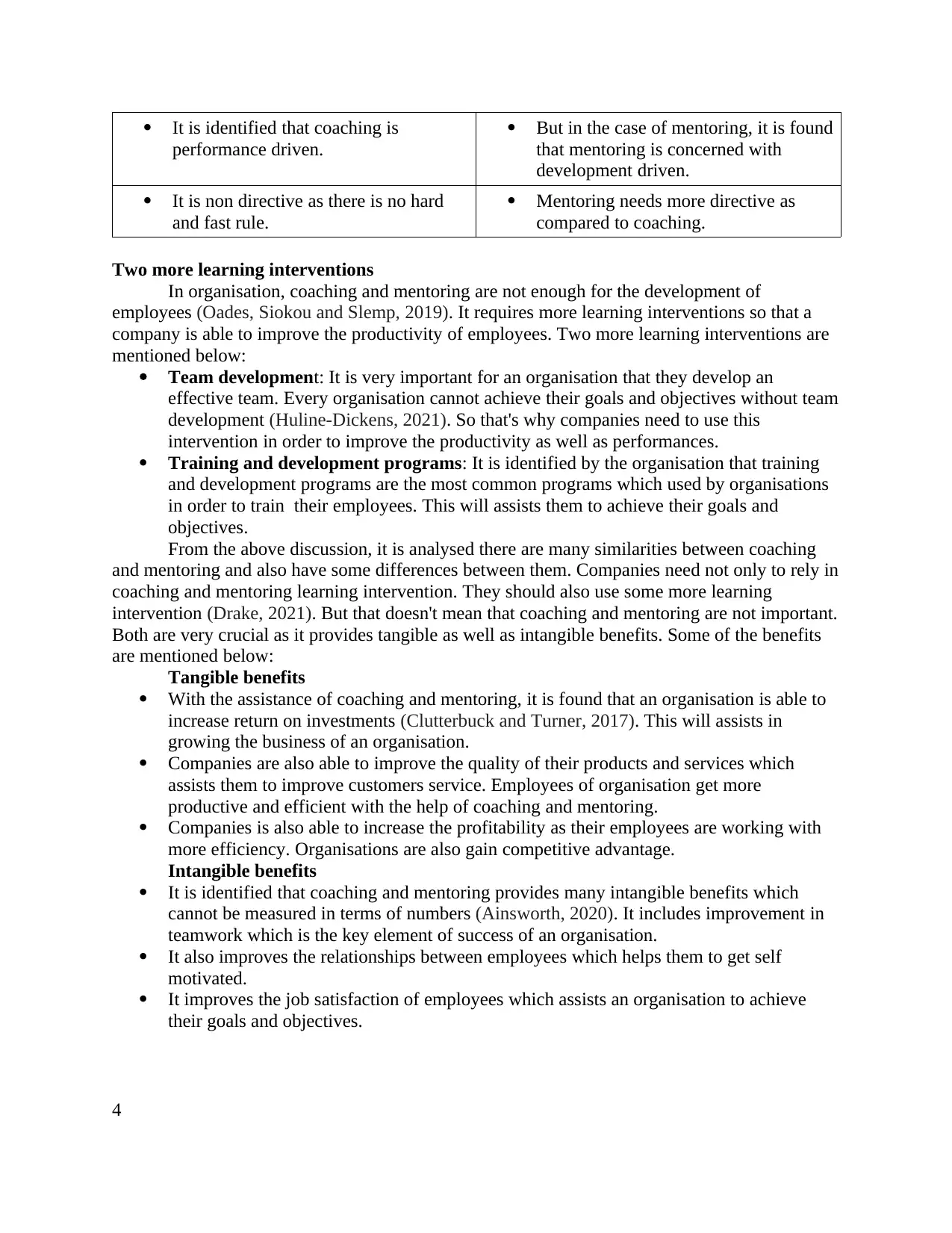
It is identified that coaching is
performance driven.
But in the case of mentoring, it is found
that mentoring is concerned with
development driven.
It is non directive as there is no hard
and fast rule.
Mentoring needs more directive as
compared to coaching.
Two more learning interventions
In organisation, coaching and mentoring are not enough for the development of
employees (Oades, Siokou and Slemp, 2019). It requires more learning interventions so that a
company is able to improve the productivity of employees. Two more learning interventions are
mentioned below:
Team development: It is very important for an organisation that they develop an
effective team. Every organisation cannot achieve their goals and objectives without team
development (Huline-Dickens, 2021). So that's why companies need to use this
intervention in order to improve the productivity as well as performances.
Training and development programs: It is identified by the organisation that training
and development programs are the most common programs which used by organisations
in order to train their employees. This will assists them to achieve their goals and
objectives.
From the above discussion, it is analysed there are many similarities between coaching
and mentoring and also have some differences between them. Companies need not only to rely in
coaching and mentoring learning intervention. They should also use some more learning
intervention (Drake, 2021). But that doesn't mean that coaching and mentoring are not important.
Both are very crucial as it provides tangible as well as intangible benefits. Some of the benefits
are mentioned below:
Tangible benefits
With the assistance of coaching and mentoring, it is found that an organisation is able to
increase return on investments (Clutterbuck and Turner, 2017). This will assists in
growing the business of an organisation.
Companies are also able to improve the quality of their products and services which
assists them to improve customers service. Employees of organisation get more
productive and efficient with the help of coaching and mentoring.
Companies is also able to increase the profitability as their employees are working with
more efficiency. Organisations are also gain competitive advantage.
Intangible benefits
It is identified that coaching and mentoring provides many intangible benefits which
cannot be measured in terms of numbers (Ainsworth, 2020). It includes improvement in
teamwork which is the key element of success of an organisation.
It also improves the relationships between employees which helps them to get self
motivated.
It improves the job satisfaction of employees which assists an organisation to achieve
their goals and objectives.
4
performance driven.
But in the case of mentoring, it is found
that mentoring is concerned with
development driven.
It is non directive as there is no hard
and fast rule.
Mentoring needs more directive as
compared to coaching.
Two more learning interventions
In organisation, coaching and mentoring are not enough for the development of
employees (Oades, Siokou and Slemp, 2019). It requires more learning interventions so that a
company is able to improve the productivity of employees. Two more learning interventions are
mentioned below:
Team development: It is very important for an organisation that they develop an
effective team. Every organisation cannot achieve their goals and objectives without team
development (Huline-Dickens, 2021). So that's why companies need to use this
intervention in order to improve the productivity as well as performances.
Training and development programs: It is identified by the organisation that training
and development programs are the most common programs which used by organisations
in order to train their employees. This will assists them to achieve their goals and
objectives.
From the above discussion, it is analysed there are many similarities between coaching
and mentoring and also have some differences between them. Companies need not only to rely in
coaching and mentoring learning intervention. They should also use some more learning
intervention (Drake, 2021). But that doesn't mean that coaching and mentoring are not important.
Both are very crucial as it provides tangible as well as intangible benefits. Some of the benefits
are mentioned below:
Tangible benefits
With the assistance of coaching and mentoring, it is found that an organisation is able to
increase return on investments (Clutterbuck and Turner, 2017). This will assists in
growing the business of an organisation.
Companies are also able to improve the quality of their products and services which
assists them to improve customers service. Employees of organisation get more
productive and efficient with the help of coaching and mentoring.
Companies is also able to increase the profitability as their employees are working with
more efficiency. Organisations are also gain competitive advantage.
Intangible benefits
It is identified that coaching and mentoring provides many intangible benefits which
cannot be measured in terms of numbers (Ainsworth, 2020). It includes improvement in
teamwork which is the key element of success of an organisation.
It also improves the relationships between employees which helps them to get self
motivated.
It improves the job satisfaction of employees which assists an organisation to achieve
their goals and objectives.
4
Paraphrase This Document
Need a fresh take? Get an instant paraphrase of this document with our AI Paraphraser
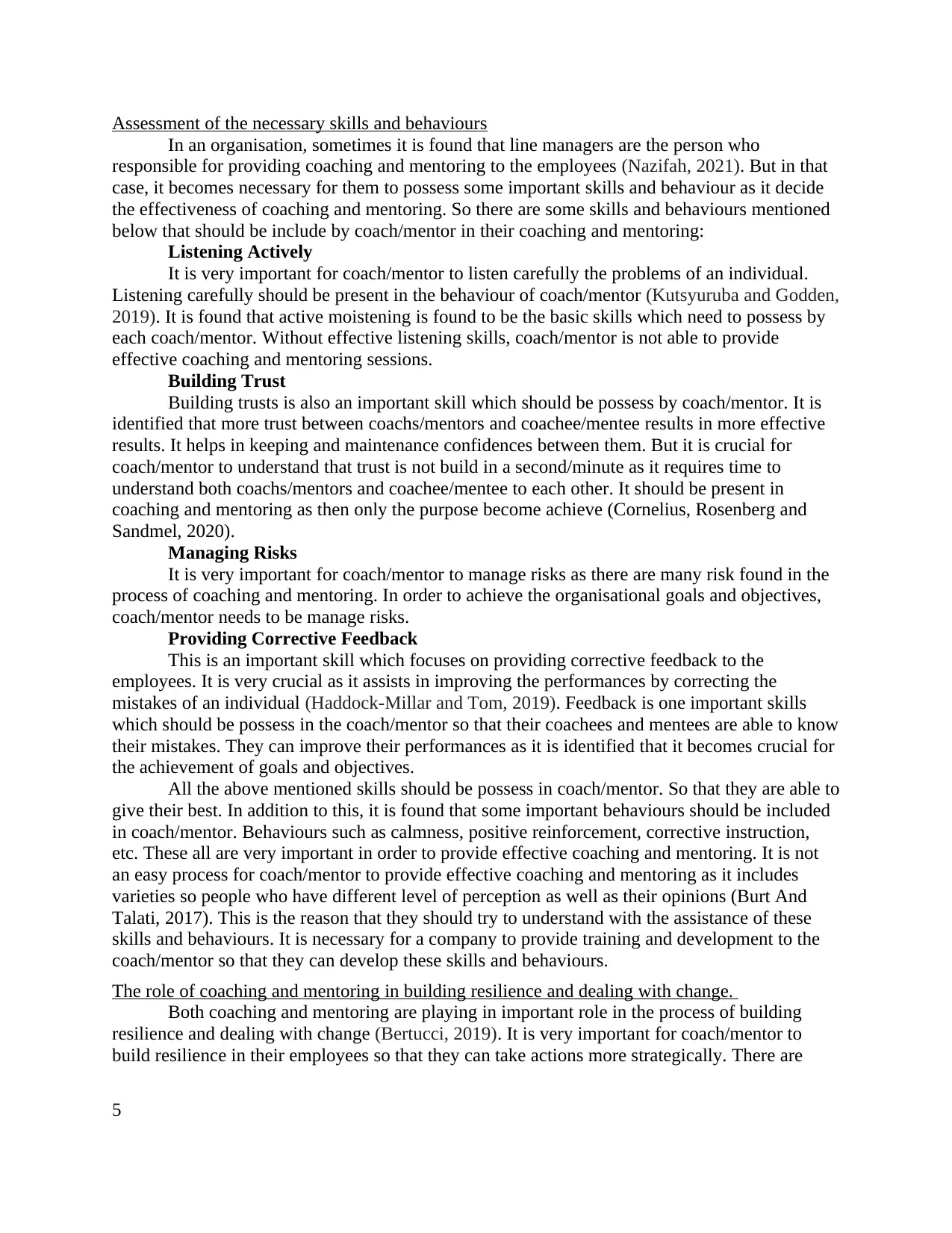
Assessment of the necessary skills and behaviours
In an organisation, sometimes it is found that line managers are the person who
responsible for providing coaching and mentoring to the employees (Nazifah, 2021). But in that
case, it becomes necessary for them to possess some important skills and behaviour as it decide
the effectiveness of coaching and mentoring. So there are some skills and behaviours mentioned
below that should be include by coach/mentor in their coaching and mentoring:
Listening Actively
It is very important for coach/mentor to listen carefully the problems of an individual.
Listening carefully should be present in the behaviour of coach/mentor (Kutsyuruba and Godden,
2019). It is found that active moistening is found to be the basic skills which need to possess by
each coach/mentor. Without effective listening skills, coach/mentor is not able to provide
effective coaching and mentoring sessions.
Building Trust
Building trusts is also an important skill which should be possess by coach/mentor. It is
identified that more trust between coachs/mentors and coachee/mentee results in more effective
results. It helps in keeping and maintenance confidences between them. But it is crucial for
coach/mentor to understand that trust is not build in a second/minute as it requires time to
understand both coachs/mentors and coachee/mentee to each other. It should be present in
coaching and mentoring as then only the purpose become achieve (Cornelius, Rosenberg and
Sandmel, 2020).
Managing Risks
It is very important for coach/mentor to manage risks as there are many risk found in the
process of coaching and mentoring. In order to achieve the organisational goals and objectives,
coach/mentor needs to be manage risks.
Providing Corrective Feedback
This is an important skill which focuses on providing corrective feedback to the
employees. It is very crucial as it assists in improving the performances by correcting the
mistakes of an individual (Haddock-Millar and Tom, 2019). Feedback is one important skills
which should be possess in the coach/mentor so that their coachees and mentees are able to know
their mistakes. They can improve their performances as it is identified that it becomes crucial for
the achievement of goals and objectives.
All the above mentioned skills should be possess in coach/mentor. So that they are able to
give their best. In addition to this, it is found that some important behaviours should be included
in coach/mentor. Behaviours such as calmness, positive reinforcement, corrective instruction,
etc. These all are very important in order to provide effective coaching and mentoring. It is not
an easy process for coach/mentor to provide effective coaching and mentoring as it includes
varieties so people who have different level of perception as well as their opinions (Burt And
Talati, 2017). This is the reason that they should try to understand with the assistance of these
skills and behaviours. It is necessary for a company to provide training and development to the
coach/mentor so that they can develop these skills and behaviours.
The role of coaching and mentoring in building resilience and dealing with change.
Both coaching and mentoring are playing in important role in the process of building
resilience and dealing with change (Bertucci, 2019). It is very important for coach/mentor to
build resilience in their employees so that they can take actions more strategically. There are
5
In an organisation, sometimes it is found that line managers are the person who
responsible for providing coaching and mentoring to the employees (Nazifah, 2021). But in that
case, it becomes necessary for them to possess some important skills and behaviour as it decide
the effectiveness of coaching and mentoring. So there are some skills and behaviours mentioned
below that should be include by coach/mentor in their coaching and mentoring:
Listening Actively
It is very important for coach/mentor to listen carefully the problems of an individual.
Listening carefully should be present in the behaviour of coach/mentor (Kutsyuruba and Godden,
2019). It is found that active moistening is found to be the basic skills which need to possess by
each coach/mentor. Without effective listening skills, coach/mentor is not able to provide
effective coaching and mentoring sessions.
Building Trust
Building trusts is also an important skill which should be possess by coach/mentor. It is
identified that more trust between coachs/mentors and coachee/mentee results in more effective
results. It helps in keeping and maintenance confidences between them. But it is crucial for
coach/mentor to understand that trust is not build in a second/minute as it requires time to
understand both coachs/mentors and coachee/mentee to each other. It should be present in
coaching and mentoring as then only the purpose become achieve (Cornelius, Rosenberg and
Sandmel, 2020).
Managing Risks
It is very important for coach/mentor to manage risks as there are many risk found in the
process of coaching and mentoring. In order to achieve the organisational goals and objectives,
coach/mentor needs to be manage risks.
Providing Corrective Feedback
This is an important skill which focuses on providing corrective feedback to the
employees. It is very crucial as it assists in improving the performances by correcting the
mistakes of an individual (Haddock-Millar and Tom, 2019). Feedback is one important skills
which should be possess in the coach/mentor so that their coachees and mentees are able to know
their mistakes. They can improve their performances as it is identified that it becomes crucial for
the achievement of goals and objectives.
All the above mentioned skills should be possess in coach/mentor. So that they are able to
give their best. In addition to this, it is found that some important behaviours should be included
in coach/mentor. Behaviours such as calmness, positive reinforcement, corrective instruction,
etc. These all are very important in order to provide effective coaching and mentoring. It is not
an easy process for coach/mentor to provide effective coaching and mentoring as it includes
varieties so people who have different level of perception as well as their opinions (Burt And
Talati, 2017). This is the reason that they should try to understand with the assistance of these
skills and behaviours. It is necessary for a company to provide training and development to the
coach/mentor so that they can develop these skills and behaviours.
The role of coaching and mentoring in building resilience and dealing with change.
Both coaching and mentoring are playing in important role in the process of building
resilience and dealing with change (Bertucci, 2019). It is very important for coach/mentor to
build resilience in their employees so that they can take actions more strategically. There are
5
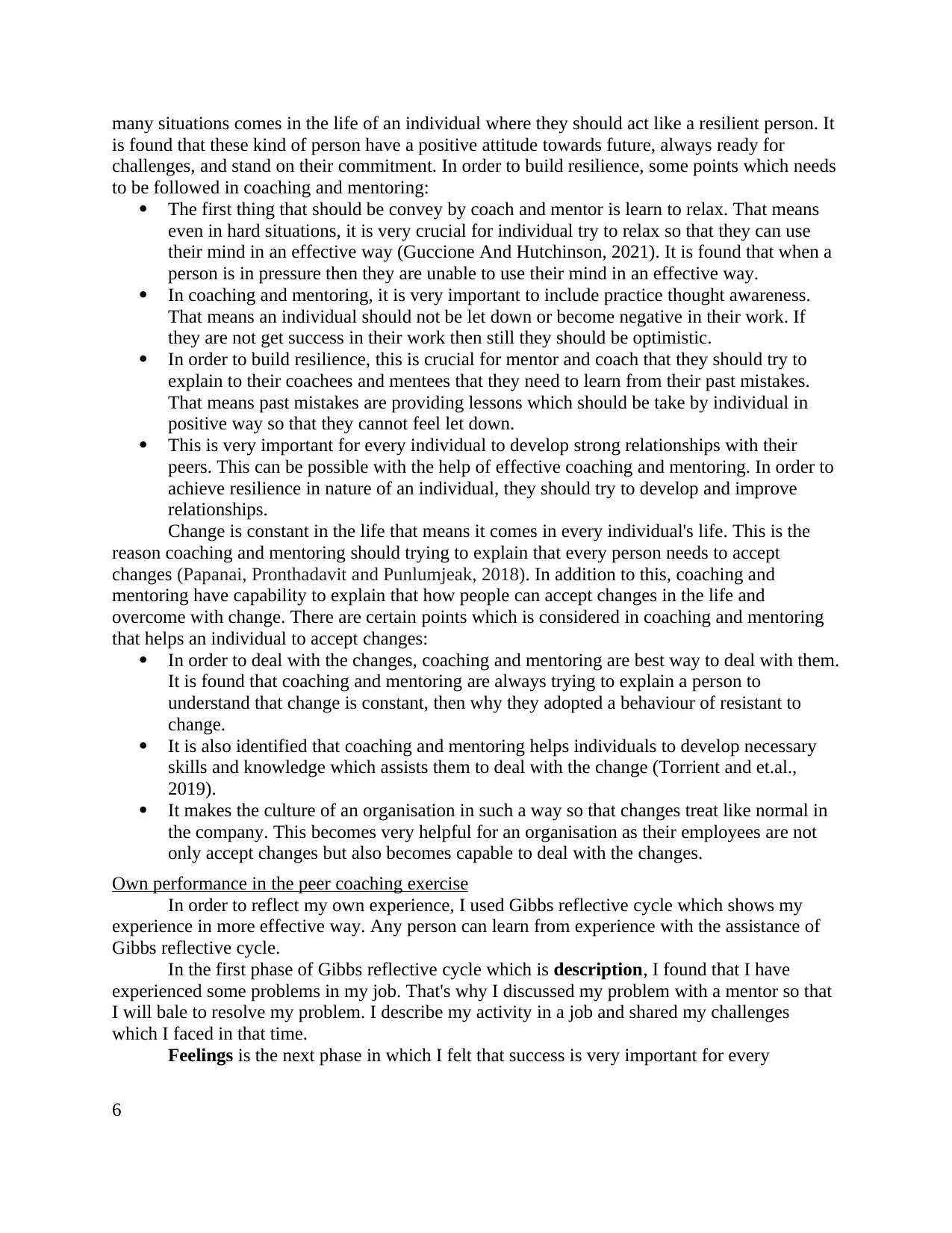
many situations comes in the life of an individual where they should act like a resilient person. It
is found that these kind of person have a positive attitude towards future, always ready for
challenges, and stand on their commitment. In order to build resilience, some points which needs
to be followed in coaching and mentoring:
The first thing that should be convey by coach and mentor is learn to relax. That means
even in hard situations, it is very crucial for individual try to relax so that they can use
their mind in an effective way (Guccione And Hutchinson, 2021). It is found that when a
person is in pressure then they are unable to use their mind in an effective way.
In coaching and mentoring, it is very important to include practice thought awareness.
That means an individual should not be let down or become negative in their work. If
they are not get success in their work then still they should be optimistic.
In order to build resilience, this is crucial for mentor and coach that they should try to
explain to their coachees and mentees that they need to learn from their past mistakes.
That means past mistakes are providing lessons which should be take by individual in
positive way so that they cannot feel let down.
This is very important for every individual to develop strong relationships with their
peers. This can be possible with the help of effective coaching and mentoring. In order to
achieve resilience in nature of an individual, they should try to develop and improve
relationships.
Change is constant in the life that means it comes in every individual's life. This is the
reason coaching and mentoring should trying to explain that every person needs to accept
changes (Papanai, Pronthadavit and Punlumjeak, 2018). In addition to this, coaching and
mentoring have capability to explain that how people can accept changes in the life and
overcome with change. There are certain points which is considered in coaching and mentoring
that helps an individual to accept changes:
In order to deal with the changes, coaching and mentoring are best way to deal with them.
It is found that coaching and mentoring are always trying to explain a person to
understand that change is constant, then why they adopted a behaviour of resistant to
change.
It is also identified that coaching and mentoring helps individuals to develop necessary
skills and knowledge which assists them to deal with the change (Torrient and et.al.,
2019).
It makes the culture of an organisation in such a way so that changes treat like normal in
the company. This becomes very helpful for an organisation as their employees are not
only accept changes but also becomes capable to deal with the changes.
Own performance in the peer coaching exercise
In order to reflect my own experience, I used Gibbs reflective cycle which shows my
experience in more effective way. Any person can learn from experience with the assistance of
Gibbs reflective cycle.
In the first phase of Gibbs reflective cycle which is description, I found that I have
experienced some problems in my job. That's why I discussed my problem with a mentor so that
I will bale to resolve my problem. I describe my activity in a job and shared my challenges
which I faced in that time.
Feelings is the next phase in which I felt that success is very important for every
6
is found that these kind of person have a positive attitude towards future, always ready for
challenges, and stand on their commitment. In order to build resilience, some points which needs
to be followed in coaching and mentoring:
The first thing that should be convey by coach and mentor is learn to relax. That means
even in hard situations, it is very crucial for individual try to relax so that they can use
their mind in an effective way (Guccione And Hutchinson, 2021). It is found that when a
person is in pressure then they are unable to use their mind in an effective way.
In coaching and mentoring, it is very important to include practice thought awareness.
That means an individual should not be let down or become negative in their work. If
they are not get success in their work then still they should be optimistic.
In order to build resilience, this is crucial for mentor and coach that they should try to
explain to their coachees and mentees that they need to learn from their past mistakes.
That means past mistakes are providing lessons which should be take by individual in
positive way so that they cannot feel let down.
This is very important for every individual to develop strong relationships with their
peers. This can be possible with the help of effective coaching and mentoring. In order to
achieve resilience in nature of an individual, they should try to develop and improve
relationships.
Change is constant in the life that means it comes in every individual's life. This is the
reason coaching and mentoring should trying to explain that every person needs to accept
changes (Papanai, Pronthadavit and Punlumjeak, 2018). In addition to this, coaching and
mentoring have capability to explain that how people can accept changes in the life and
overcome with change. There are certain points which is considered in coaching and mentoring
that helps an individual to accept changes:
In order to deal with the changes, coaching and mentoring are best way to deal with them.
It is found that coaching and mentoring are always trying to explain a person to
understand that change is constant, then why they adopted a behaviour of resistant to
change.
It is also identified that coaching and mentoring helps individuals to develop necessary
skills and knowledge which assists them to deal with the change (Torrient and et.al.,
2019).
It makes the culture of an organisation in such a way so that changes treat like normal in
the company. This becomes very helpful for an organisation as their employees are not
only accept changes but also becomes capable to deal with the changes.
Own performance in the peer coaching exercise
In order to reflect my own experience, I used Gibbs reflective cycle which shows my
experience in more effective way. Any person can learn from experience with the assistance of
Gibbs reflective cycle.
In the first phase of Gibbs reflective cycle which is description, I found that I have
experienced some problems in my job. That's why I discussed my problem with a mentor so that
I will bale to resolve my problem. I describe my activity in a job and shared my challenges
which I faced in that time.
Feelings is the next phase in which I felt that success is very important for every
6
⊘ This is a preview!⊘
Do you want full access?
Subscribe today to unlock all pages.

Trusted by 1+ million students worldwide
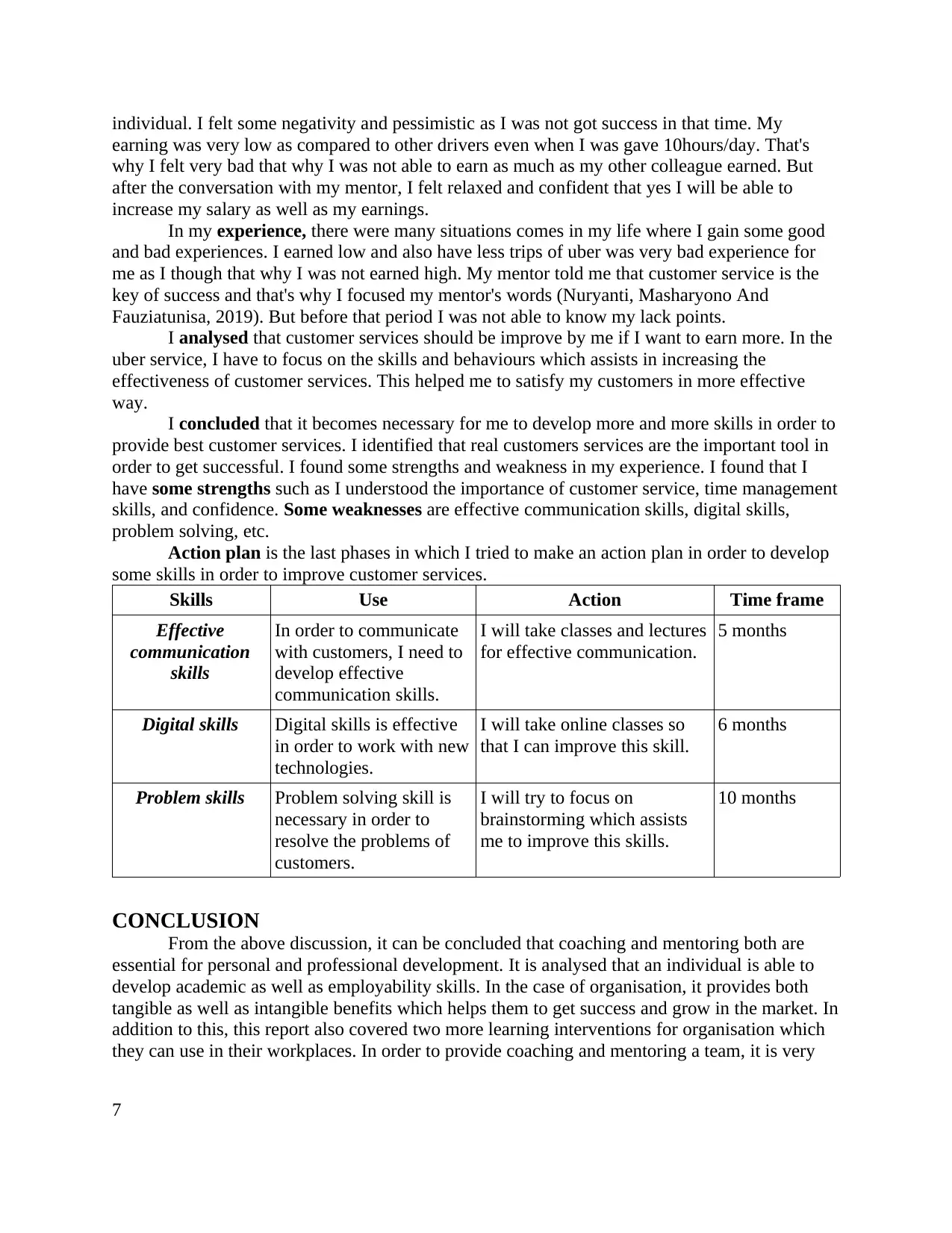
individual. I felt some negativity and pessimistic as I was not got success in that time. My
earning was very low as compared to other drivers even when I was gave 10hours/day. That's
why I felt very bad that why I was not able to earn as much as my other colleague earned. But
after the conversation with my mentor, I felt relaxed and confident that yes I will be able to
increase my salary as well as my earnings.
In my experience, there were many situations comes in my life where I gain some good
and bad experiences. I earned low and also have less trips of uber was very bad experience for
me as I though that why I was not earned high. My mentor told me that customer service is the
key of success and that's why I focused my mentor's words (Nuryanti, Masharyono And
Fauziatunisa, 2019). But before that period I was not able to know my lack points.
I analysed that customer services should be improve by me if I want to earn more. In the
uber service, I have to focus on the skills and behaviours which assists in increasing the
effectiveness of customer services. This helped me to satisfy my customers in more effective
way.
I concluded that it becomes necessary for me to develop more and more skills in order to
provide best customer services. I identified that real customers services are the important tool in
order to get successful. I found some strengths and weakness in my experience. I found that I
have some strengths such as I understood the importance of customer service, time management
skills, and confidence. Some weaknesses are effective communication skills, digital skills,
problem solving, etc.
Action plan is the last phases in which I tried to make an action plan in order to develop
some skills in order to improve customer services.
Skills Use Action Time frame
Effective
communication
skills
In order to communicate
with customers, I need to
develop effective
communication skills.
I will take classes and lectures
for effective communication.
5 months
Digital skills Digital skills is effective
in order to work with new
technologies.
I will take online classes so
that I can improve this skill.
6 months
Problem skills Problem solving skill is
necessary in order to
resolve the problems of
customers.
I will try to focus on
brainstorming which assists
me to improve this skills.
10 months
CONCLUSION
From the above discussion, it can be concluded that coaching and mentoring both are
essential for personal and professional development. It is analysed that an individual is able to
develop academic as well as employability skills. In the case of organisation, it provides both
tangible as well as intangible benefits which helps them to get success and grow in the market. In
addition to this, this report also covered two more learning interventions for organisation which
they can use in their workplaces. In order to provide coaching and mentoring a team, it is very
7
earning was very low as compared to other drivers even when I was gave 10hours/day. That's
why I felt very bad that why I was not able to earn as much as my other colleague earned. But
after the conversation with my mentor, I felt relaxed and confident that yes I will be able to
increase my salary as well as my earnings.
In my experience, there were many situations comes in my life where I gain some good
and bad experiences. I earned low and also have less trips of uber was very bad experience for
me as I though that why I was not earned high. My mentor told me that customer service is the
key of success and that's why I focused my mentor's words (Nuryanti, Masharyono And
Fauziatunisa, 2019). But before that period I was not able to know my lack points.
I analysed that customer services should be improve by me if I want to earn more. In the
uber service, I have to focus on the skills and behaviours which assists in increasing the
effectiveness of customer services. This helped me to satisfy my customers in more effective
way.
I concluded that it becomes necessary for me to develop more and more skills in order to
provide best customer services. I identified that real customers services are the important tool in
order to get successful. I found some strengths and weakness in my experience. I found that I
have some strengths such as I understood the importance of customer service, time management
skills, and confidence. Some weaknesses are effective communication skills, digital skills,
problem solving, etc.
Action plan is the last phases in which I tried to make an action plan in order to develop
some skills in order to improve customer services.
Skills Use Action Time frame
Effective
communication
skills
In order to communicate
with customers, I need to
develop effective
communication skills.
I will take classes and lectures
for effective communication.
5 months
Digital skills Digital skills is effective
in order to work with new
technologies.
I will take online classes so
that I can improve this skill.
6 months
Problem skills Problem solving skill is
necessary in order to
resolve the problems of
customers.
I will try to focus on
brainstorming which assists
me to improve this skills.
10 months
CONCLUSION
From the above discussion, it can be concluded that coaching and mentoring both are
essential for personal and professional development. It is analysed that an individual is able to
develop academic as well as employability skills. In the case of organisation, it provides both
tangible as well as intangible benefits which helps them to get success and grow in the market. In
addition to this, this report also covered two more learning interventions for organisation which
they can use in their workplaces. In order to provide coaching and mentoring a team, it is very
7
Paraphrase This Document
Need a fresh take? Get an instant paraphrase of this document with our AI Paraphraser

important for coach and mentor to possess some important skills so that they give their best.
There was also a discussion of role of coaching and mentoring in order to deal with the change as
well as building resilience.
8
There was also a discussion of role of coaching and mentoring in order to deal with the change as
well as building resilience.
8
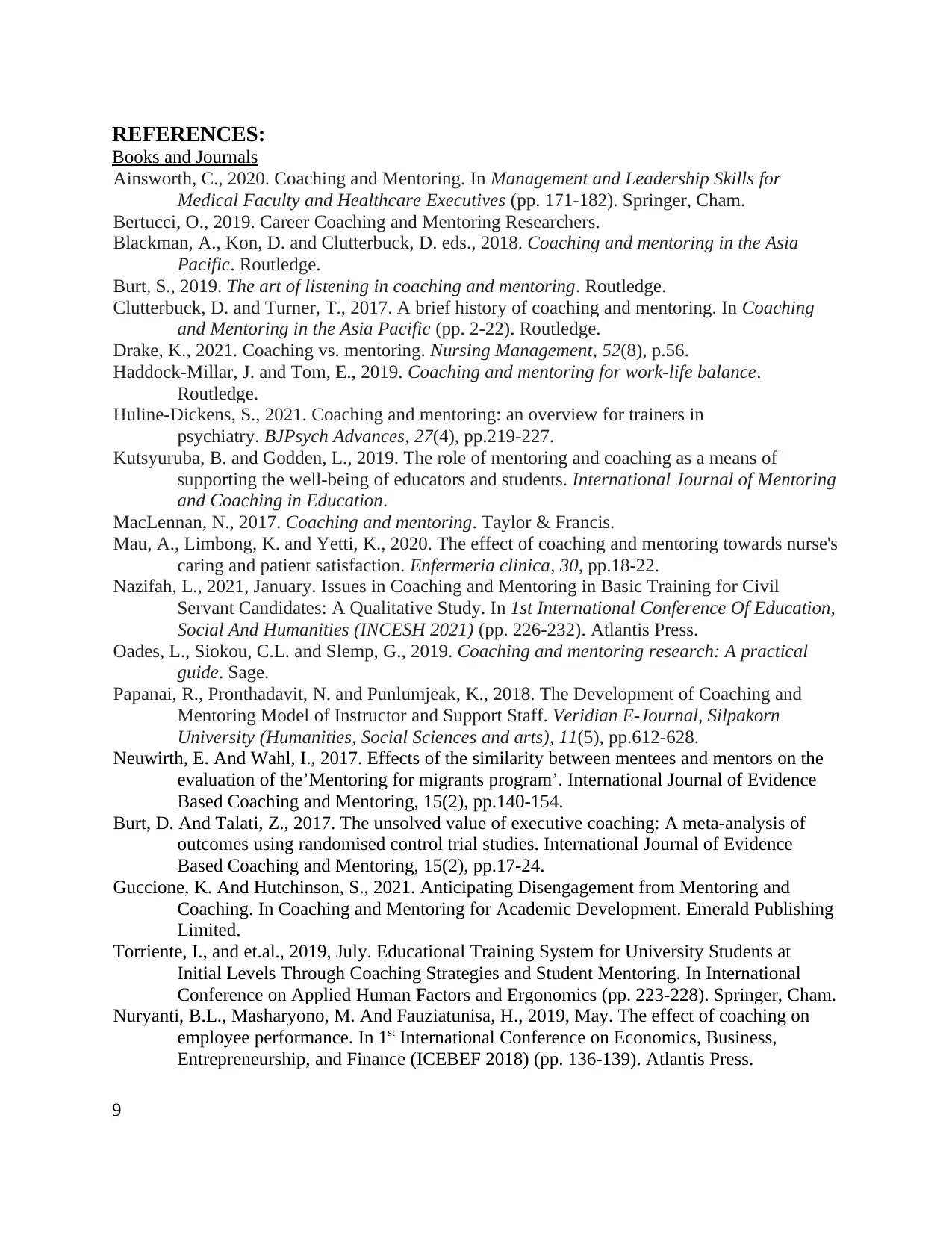
REFERENCES:
Books and Journals
Ainsworth, C., 2020. Coaching and Mentoring. In Management and Leadership Skills for
Medical Faculty and Healthcare Executives (pp. 171-182). Springer, Cham.
Bertucci, O., 2019. Career Coaching and Mentoring Researchers.
Blackman, A., Kon, D. and Clutterbuck, D. eds., 2018. Coaching and mentoring in the Asia
Pacific. Routledge.
Burt, S., 2019. The art of listening in coaching and mentoring. Routledge.
Clutterbuck, D. and Turner, T., 2017. A brief history of coaching and mentoring. In Coaching
and Mentoring in the Asia Pacific (pp. 2-22). Routledge.
Drake, K., 2021. Coaching vs. mentoring. Nursing Management, 52(8), p.56.
Haddock-Millar, J. and Tom, E., 2019. Coaching and mentoring for work-life balance.
Routledge.
Huline-Dickens, S., 2021. Coaching and mentoring: an overview for trainers in
psychiatry. BJPsych Advances, 27(4), pp.219-227.
Kutsyuruba, B. and Godden, L., 2019. The role of mentoring and coaching as a means of
supporting the well-being of educators and students. International Journal of Mentoring
and Coaching in Education.
MacLennan, N., 2017. Coaching and mentoring. Taylor & Francis.
Mau, A., Limbong, K. and Yetti, K., 2020. The effect of coaching and mentoring towards nurse's
caring and patient satisfaction. Enfermeria clinica, 30, pp.18-22.
Nazifah, L., 2021, January. Issues in Coaching and Mentoring in Basic Training for Civil
Servant Candidates: A Qualitative Study. In 1st International Conference Of Education,
Social And Humanities (INCESH 2021) (pp. 226-232). Atlantis Press.
Oades, L., Siokou, C.L. and Slemp, G., 2019. Coaching and mentoring research: A practical
guide. Sage.
Papanai, R., Pronthadavit, N. and Punlumjeak, K., 2018. The Development of Coaching and
Mentoring Model of Instructor and Support Staff. Veridian E-Journal, Silpakorn
University (Humanities, Social Sciences and arts), 11(5), pp.612-628.
Neuwirth, E. And Wahl, I., 2017. Effects of the similarity between mentees and mentors on the
evaluation of the’Mentoring for migrants program’. International Journal of Evidence
Based Coaching and Mentoring, 15(2), pp.140-154.
Burt, D. And Talati, Z., 2017. The unsolved value of executive coaching: A meta-analysis of
outcomes using randomised control trial studies. International Journal of Evidence
Based Coaching and Mentoring, 15(2), pp.17-24.
Guccione, K. And Hutchinson, S., 2021. Anticipating Disengagement from Mentoring and
Coaching. In Coaching and Mentoring for Academic Development. Emerald Publishing
Limited.
Torriente, I., and et.al., 2019, July. Educational Training System for University Students at
Initial Levels Through Coaching Strategies and Student Mentoring. In International
Conference on Applied Human Factors and Ergonomics (pp. 223-228). Springer, Cham.
Nuryanti, B.L., Masharyono, M. And Fauziatunisa, H., 2019, May. The effect of coaching on
employee performance. In 1st International Conference on Economics, Business,
Entrepreneurship, and Finance (ICEBEF 2018) (pp. 136-139). Atlantis Press.
9
Books and Journals
Ainsworth, C., 2020. Coaching and Mentoring. In Management and Leadership Skills for
Medical Faculty and Healthcare Executives (pp. 171-182). Springer, Cham.
Bertucci, O., 2019. Career Coaching and Mentoring Researchers.
Blackman, A., Kon, D. and Clutterbuck, D. eds., 2018. Coaching and mentoring in the Asia
Pacific. Routledge.
Burt, S., 2019. The art of listening in coaching and mentoring. Routledge.
Clutterbuck, D. and Turner, T., 2017. A brief history of coaching and mentoring. In Coaching
and Mentoring in the Asia Pacific (pp. 2-22). Routledge.
Drake, K., 2021. Coaching vs. mentoring. Nursing Management, 52(8), p.56.
Haddock-Millar, J. and Tom, E., 2019. Coaching and mentoring for work-life balance.
Routledge.
Huline-Dickens, S., 2021. Coaching and mentoring: an overview for trainers in
psychiatry. BJPsych Advances, 27(4), pp.219-227.
Kutsyuruba, B. and Godden, L., 2019. The role of mentoring and coaching as a means of
supporting the well-being of educators and students. International Journal of Mentoring
and Coaching in Education.
MacLennan, N., 2017. Coaching and mentoring. Taylor & Francis.
Mau, A., Limbong, K. and Yetti, K., 2020. The effect of coaching and mentoring towards nurse's
caring and patient satisfaction. Enfermeria clinica, 30, pp.18-22.
Nazifah, L., 2021, January. Issues in Coaching and Mentoring in Basic Training for Civil
Servant Candidates: A Qualitative Study. In 1st International Conference Of Education,
Social And Humanities (INCESH 2021) (pp. 226-232). Atlantis Press.
Oades, L., Siokou, C.L. and Slemp, G., 2019. Coaching and mentoring research: A practical
guide. Sage.
Papanai, R., Pronthadavit, N. and Punlumjeak, K., 2018. The Development of Coaching and
Mentoring Model of Instructor and Support Staff. Veridian E-Journal, Silpakorn
University (Humanities, Social Sciences and arts), 11(5), pp.612-628.
Neuwirth, E. And Wahl, I., 2017. Effects of the similarity between mentees and mentors on the
evaluation of the’Mentoring for migrants program’. International Journal of Evidence
Based Coaching and Mentoring, 15(2), pp.140-154.
Burt, D. And Talati, Z., 2017. The unsolved value of executive coaching: A meta-analysis of
outcomes using randomised control trial studies. International Journal of Evidence
Based Coaching and Mentoring, 15(2), pp.17-24.
Guccione, K. And Hutchinson, S., 2021. Anticipating Disengagement from Mentoring and
Coaching. In Coaching and Mentoring for Academic Development. Emerald Publishing
Limited.
Torriente, I., and et.al., 2019, July. Educational Training System for University Students at
Initial Levels Through Coaching Strategies and Student Mentoring. In International
Conference on Applied Human Factors and Ergonomics (pp. 223-228). Springer, Cham.
Nuryanti, B.L., Masharyono, M. And Fauziatunisa, H., 2019, May. The effect of coaching on
employee performance. In 1st International Conference on Economics, Business,
Entrepreneurship, and Finance (ICEBEF 2018) (pp. 136-139). Atlantis Press.
9
⊘ This is a preview!⊘
Do you want full access?
Subscribe today to unlock all pages.

Trusted by 1+ million students worldwide

Chambers, F.C. ed., 2018. Learning to mentor in sports coaching: A design thinking approach.
Routledge.
Cornelius, K.E., Rosenberg, M.S. and Sandmel, K.N., 2020. Examining the impact of
professional development and coaching on mentoring of novice special educators.
Action in Teacher Education, 42(3), pp.253-270.
10
Routledge.
Cornelius, K.E., Rosenberg, M.S. and Sandmel, K.N., 2020. Examining the impact of
professional development and coaching on mentoring of novice special educators.
Action in Teacher Education, 42(3), pp.253-270.
10
1 out of 10
Related Documents
Your All-in-One AI-Powered Toolkit for Academic Success.
+13062052269
info@desklib.com
Available 24*7 on WhatsApp / Email
![[object Object]](/_next/static/media/star-bottom.7253800d.svg)
Unlock your academic potential
Copyright © 2020–2026 A2Z Services. All Rights Reserved. Developed and managed by ZUCOL.





